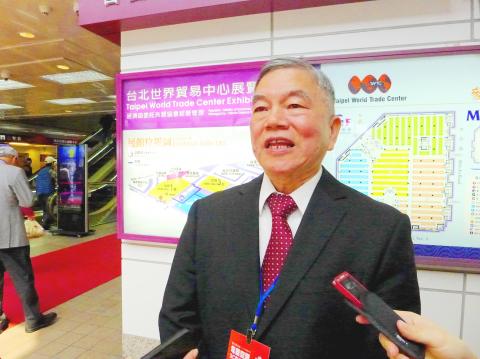Minister of Economic Affairs Shen Jong-chin (沈榮津) yesterday said that a moderate hike in electricity rates of about 3.5 percent for big industrial users was reasonable, adding that some businesses have said an increase of about 3 percent would be acceptable to them.
Shen made the remarks on the sidelines of a consumer electronics trade show at the Taipei World Trade Center — which started on Friday and is to end today — in response to concerns that large industrial consumers subject to the rate hike might raise their prices due to increased electricity costs.
The ministry’s electricity price review committee on Friday announced that state-run Taiwan Power Co (Taipower, 台電) is to raise electricity rates by an average of 3 percent, or NT$0.0765 per kilowatt-hour (kWh), from April 1.

Photo: Lee Ya-wen, Taipei Times
Electricity rates are to be raised from NT$2.5488 to NT$2.6253 per kWh, but households that use less than 500kWh and small businesses that use less than 1,500kWh per month would not have their electricity rates increased, meaning that more than 80 percent of users would remain unaffected by the rate hikes, the ministry said.
Therefore, the latest electricity rate adjustment would not affect small businesses and would only drive up local consumer prices by 0.08 percent, Shen said.
Asked if the ministry would consider providing people with subsidies for the purchase of energy-efficient home appliances, such as air conditioners, refrigerators, TVs and water heaters, in a bid to promote domestic energy conservation, Shen said the ministry has talked with home appliance and electronics suppliers and distributors to come up with measures to promote such products.
Taipower has not released a detailed pricing plan for different categories of consumers, but under the new scheme, big households, large businesses and certain industrial users are expected to shoulder an average 3.45 percent increase in their electricity bills, the ministry said.
Based on a 3.45 percent increase, households using 501kWh to 700kWh per month would see their bills increase by NT$3.92 per kWh, while those using 701kWh to 1,000kWh per month would see an increase of NT$4.57 per kWh and those using more than 1,001kWh would see an increase of NT$5 per kWh.
Those using 1,000kWh per month and those using 2,000kWh would see their monthly electricity payments increase by NT$72 and NT$83, respectively.
Meanwhile, Shen said members of the delegation led by Minister Without Portfolio John Deng (鄧振中), which flew to the US yesterday to negotiate the exemption of Taiwanese steel and aluminum exports from US tariffs, included economic officials, as well as representatives from local steel companies and trade associations.
The Chinese-language Liberty Times (the sister paper of the Taipei Times) yesterday quoted Shen as saying that the delegation would meet with major US buyers of Taiwanese steel and aluminum products and let them further discuss the tariff issue with US congressional leaders.
The delegation would seek to talk with US foreign-trade agencies during its one-week visit, he said.

GROWING OWINGS: While Luxembourg and China swapped the top three spots, the US continued to be the largest exposure for Taiwan for the 41st consecutive quarter The US remained the largest debtor nation to Taiwan’s banking sector for the 41st consecutive quarter at the end of September, after local banks’ exposure to the US market rose more than 2 percent from three months earlier, the central bank said. Exposure to the US increased to US$198.896 billion, up US$4.026 billion, or 2.07 percent, from US$194.87 billion in the previous quarter, data released by the central bank showed on Friday. Of the increase, about US$1.4 billion came from banks’ investments in securitized products and interbank loans in the US, while another US$2.6 billion stemmed from trust assets, including mutual funds,

AI TALENT: No financial details were released about the deal, in which top Groq executives, including its CEO, would join Nvidia to help advance the technology Nvidia Corp has agreed to a licensing deal with artificial intelligence (AI) start-up Groq, furthering its investments in companies connected to the AI boom and gaining the right to add a new type of technology to its products. The world’s largest publicly traded company has paid for the right to use Groq’s technology and is to integrate its chip design into future products. Some of the start-up’s executives are leaving to join Nvidia to help with that effort, the companies said. Groq would continue as an independent company with a new chief executive, it said on Wednesday in a post on its Web

RESPONSE: The Japanese Ministry of Finance might have to intervene in the currency markets should the yen keep weakening toward the 160 level against the US dollar Japan’s chief currency official yesterday sent a warning on recent foreign exchange moves, after the yen weakened against the US dollar following Friday last week’s Bank of Japan (BOJ) decision. “We’re seeing one-directional, sudden moves especially after last week’s monetary policy meeting, so I’m deeply concerned,” Japanese Vice Finance Minister for International Affairs Atsushi Mimura told reporters. “We’d like to take appropriate responses against excessive moves.” The central bank on Friday raised its benchmark interest rate to the highest in 30 years, but Bank of Japan Governor Kazuo Ueda chose to keep his options open rather than bolster the yen,

Even as the US is embarked on a bitter rivalry with China over the deployment of artificial intelligence (AI), Chinese technology is quietly making inroads into the US market. Despite considerable geopolitical tensions, Chinese open-source AI models are winning over a growing number of programmers and companies in the US. These are different from the closed generative AI models that have become household names — ChatGPT-maker OpenAI or Google’s Gemini — whose inner workings are fiercely protected. In contrast, “open” models offered by many Chinese rivals, from Alibaba (阿里巴巴) to DeepSeek (深度求索), allow programmers to customize parts of the software to suit their